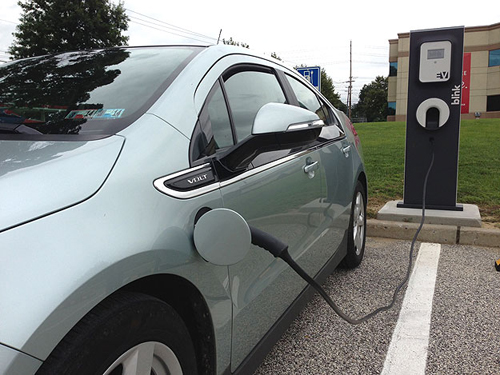Press Release: Carnegie Mellon Study Says Electric Vehicles Could Be Cheaper To Recharge if Electricity Providers Control Charging Speeds
CMU Researchers Studied New Vehicle Charge Loads on New York Power Plant Operations
Contact: Chriss Swaney / 412-268-5776 / swaney@andrew.cmu.edu
 PITTSBURGH—Electric vehicles may offer a path to a more sustainable transportation future. But they also might drive up electricity prices if they are charged during times of peak electricity demand.
PITTSBURGH—Electric vehicles may offer a path to a more sustainable transportation future. But they also might drive up electricity prices if they are charged during times of peak electricity demand.
In a new study, Carnegie Mellon University researchers found that optimally varying the charging speed of plug-in electric vehicles can cut the cost of generating electricity to charge these vehicles in half.
Engineering and Public Policy Department (EPP) graduate student Allison Weis and professors Paulina Jaramillo and Jeremy Michalek studied the effects of new vehicle charging loads on power plant operations in New York.
"Although plug-in electric vehicles currently make up a small percentage of the vehicle fleet, federal and state subsidies are promoting electric vehicle sales, and they may become a significant portion of the fleet in the future," Weis said. "If owners regularly plug in these electric vehicles when they get home from work, this would add to greater demand, when the most expensive power plants are running."
But it doesn't have to be that way, CMU researchers said.
"Controlled charging can shift loads later in the night when cheaper power plants are again available," said Jaramillo, an assistant professor of EPP. "Controlled charging could also help to manage fluctuations from renewable energy sources like wind and solar power, which change their output as the wind changes and as clouds pass by."
"It is already cheaper to charge an electric vehicle than fill up a gasoline vehicle," said Michalek, an associate professor of mechanical engineering and EPP, and director of the Vehicle Electrification Group. "But allowing grid operators to control electric vehicle charging speed could reduce these costs further. We see additional savings up to $70 per vehicle each year or even higher for systems that expect new power plant construction and systems with a lot of wind power."
The study, funded by the CMU RenewElec project and the National Science Foundation, will appear in February's edition of the journal Applied Energy.
The researchers warn that more study is needed to understand all the implications of controlling electric vehicle charging.
"We need to keep in mind that fossil fuel plants are typically cheap to operate, so reducing cost can sometimes result in increased emissions," Weis said. "In our next study, we plan to quantify the health and environmental impacts of these changing emissions."
###
CMU researchers found that varying the charging speed of plug-in electric vehicles can cut the electricity cost in half.